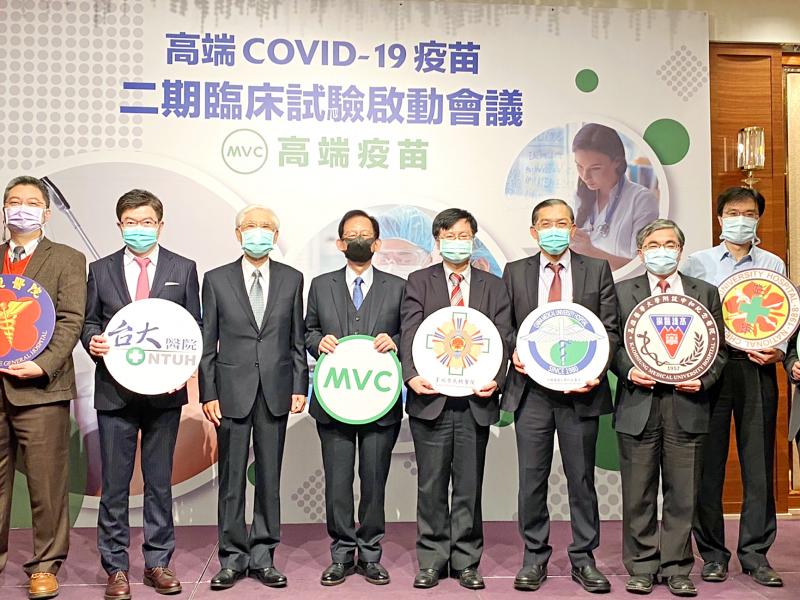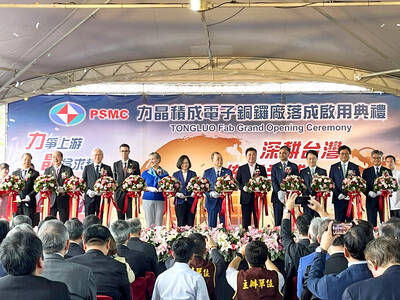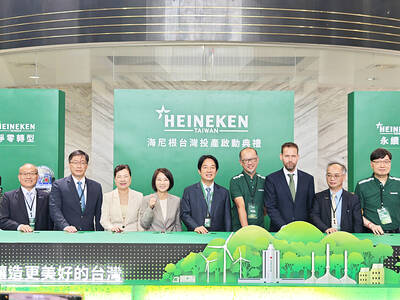Medigen Vaccine Biologics Corp (高端疫苗) on Wednesday said it plans to begin phase 2 clinical trials next week for its COVID-19 vaccine candidate and expects to apply by the end of June for emergency use authorization for the drug.
The company has started recruiting participants after last week obtaining Food and Drug Administration (FDA) permission to launch the phase 2 trials.
The company plans to recruit 3,700 participants, the most ever in such trials in Taiwan, as it aims to effectively examine the efficacy of its vaccine over the next three months, it said.

Photo: Kao Shih-ching, Taipei Times
Traditional phase 2 trials for vaccines enroll 100 to 300 participants, National Taiwan University Hospital associate professor Hsieh Szu-min (謝思民), the principal investigator of the trials, told a news conference.
Medigen would recruit at least 3,700 people, as experience shows that some participants might quit halfway through, Hsieh said.
The FDA has set strict requirements for the trials before it would grant emergency use authorization, including at least 3,000 people given the candidate vaccine in the experimental group and 500 given a placebo in the control group, he said, adding that they would be double-blind trials.
Medigen is working with 11 hospitals in Taiwan on the trials to accelerate the process, said National Health Research Institutes Chairman Lin Tzou-yien (林奏延), who is chief convener of the trials.
The vaccine, called MVC-COV1901, was developed by Medigen and the US National Institutes of Health.
Participants would be given a first dose next week and the second dose a month later, the firm said.
Medigen expects to file an application for emergency use authorization by the end of June, one month after all participants have been given both shots, it said.
The phase 2 trials might cost Medigen NT$800 million (US$28.14 million), with the average cost per participant ranging from NT$150,000 to NT$200,000, including transportation allowances, lab tests, result analyses and manufacturing costs, the company said.
The company received NT$1.7 million in government subsidies for its phase 1 trials and would receive another NT$300 million for its phase 2 trials.
In November last year it raised NT$1.92 billion by issuing 24 million new common shares.
Hsieh said that he is confident about the phase 2 clinical trials, as Medigen’s vaccine candidate showed good immunogenicity in the phase 1 trials and no participants showed any serious adverse reactions or fever.
The antibody levels in people given medium and high doses of the experimental drug were similar to those in people who contracted COVID-19 and recovered, he said.
“How long the antibodies last is still a question, but we anticipate they can persist for at least six months, which would effectively reduce the spread of the disease,” Hsieh said.
The efficacy of Moderna’s messenger RNA vaccine, which encodes the same stabilized COVID-19 spike immunogen, S-2P, in Medigen’s recombinant vaccine, could last 119 days at least, according to a preliminary analysis published by the New England Journal of Medicine, he said.
Medigen is thus far the only company in Taiwan to proceed to phase 2 clinical trials for a COVID-19 vaccine.
It would be given access to a government Web site that has recruited more than 200,000 volunteers for domestic COVID-19 vaccine trials.
Additional reporting by CNA

purpose: Tesla’s CEO sought to meet senior Chinese officials to discuss the rollout of its ‘full self-driving’ software in China and approval to transfer data they had collected Tesla Inc CEO Elon Musk arrived in Beijing yesterday on an unannounced visit, where he is expected to meet senior officials to discuss the rollout of "full self-driving" (FSD) software and permission to transfer data overseas, according to a person with knowledge of the matter. Chinese state media reported that he met Premier Li Qiang (李強) in Beijing, during which Li told Musk that Tesla's development in China could be regarded as a successful example of US-China economic and trade cooperation. Musk confirmed his meeting with the premier yesterday with a post on social media platform X. "Honored to meet with Premier Li

ARTIFICIAL INTELLIGENCE: The chipmaker last month raised its capital spending by 28 percent for this year to NT$32 billion from a previous estimate of NT$25 billion Contract chipmaker Powerchip Semiconductor Manufacturing Corp (力積電子) yesterday launched a new 12-inch fab, tapping into advanced chip-on-wafer-on-substrate (CoWoS) packaging technology to support rising demand for artificial intelligence (AI) devices. Powerchip is to offer interposers, one of three parts in CoWoS packaging technology, with shipments scheduled for the second half of this year, Powerchip chairman Frank Huang (黃崇仁) told reporters on the sidelines of a fab inauguration ceremony in the Tongluo Science Park (銅鑼科學園區) in Miaoli County yesterday. “We are working with customers to supply CoWoS-related business, utilizing part of this new fab’s capacity,” Huang said, adding that Powerchip intended to bridge

Dutch brewing company Heineken NV on Friday announced an investment of NT$13.5 billion (US$414.62 million) over the next five years in Taiwan. The first multinational brewing company to operate in Taiwan, Heineken made the statement at a ceremony held at its brewery in Pingtung County. It also outlined its efforts to make the brewery “net zero” by 2030. Heineken has been in the Taiwanese market for 20 years, Heineken Taiwan managing director Jeff Wu (吳建甫) said. With strong support from local consumers, the Dutch brewery decided to transition from sales to manufacturing in the country, Wu said. Heineken assumed majority ownership and management rights

Microsoft Corp yesterday said that it would create Thailand’s first data center region to boost cloud and artificial intelligence (AI) infrastructure, promising AI training to more than 100,000 people to develop tech. Bangkok is a key economic player in Southeast Asia, but it has lagged behind Indonesia and Singapore when it comes to the tech industry. Thailand has an “incredible opportunity to build a digital-first, AI-powered future,” Microsoft chairman and chief executive officer Satya Nadella said at an event in Bangkok. Data center regions are physical locations that store computing infrastructure, allowing secure and reliable access to cloud platforms. The global embrace of AI